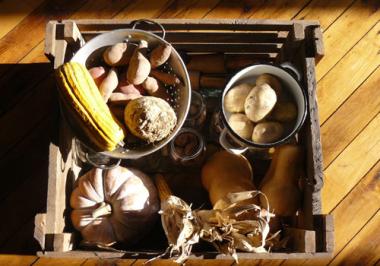There's a new gardener in town… and her name is Michelle Obama.
The nation's Victory Garden, planted on the White House lawn as a symbol of eating healthily (as opposed to meeting the food shortages created by World War II, when the original Victory Garden was planted by Eleanor Roosevelt), was renamed last week the nation's Kitchen Garden. At the helm is Michelle Obama, First Lady. She and her husband, who openly discriminates against beets, eat organically and have for years.
The Victory/Kitchen Garden is a result of a year-long effort by the organization Eat the View to make food policy a priority in the new administration. Combating obesity and promoting food security in an environment of financial duress are on the agenda. A Portland, Maine couple involved in the Eat the View initiative spent nine months eating out of their own garden. Their 1,000-square-foot plot yielded a savings of over $2,000 for the family of five.
Disclosed plans of the White House garden reveal vegetables, fruits, herbs, mulch and bees but no beets. In what is turning into a government plot to get America eating locally, an education component, initially initiated by chef Alice Waters in Berkeley over a decade ago, is being touted with images in the media of students gamboling about the Victory/Kitchen garden. They, and hopefully students across the country, will grow food for themselves and learn about nutrition, photosynthesis and why mulch matters.
In the Valley there are over 50 public schools buying food from local farmers as part of Kelly Erwin's Farm to School program, and that is old news. At Nuestras Raices in Holyoke, director Dan Ross is heading up a farm-to-school initiative with the Holyoke Food and Fitness Policy Council. Food grown this spring and summer at La Finca farm on the Connecticut River will be served at the cafeteria across the street at Dean Vocational School.
In Holyoke, statistics reveal that 45 percent of fourth graders are overweight or obese. "We are growing healthier communities in Holyoke and across the country—healthier nutritionally, environmentally, economically and socially—and it is great to see the First Family take leadership in this movement," said Ross.
Census reports released for 2007 announce 27 percent growth of small farms in the Commonwealth since 2002. In the entire nation, say the reports, Massachusetts is number two in farm-to-consumer sales of agricultural products (Connecticut is number one).
According to CISA (Community Involved in Sustaining Agriculture) executive director Phil Korman, the White House Victory/Kitchen Garden can be instrumental in turning around the battleship that is known as agribusiness.
"The new garden at the White House will allow the First Family to showcase the importance of fresh, healthy, local food and help educate our children about where our food comes from," says Korman. "I am hopeful that the White House garden will also inspire all of us to get involved in changing federal agricultural policy so that it supports all farmers and local farms."
A Victory/Kitchen Garden might not be a bad idea for the courthouse lawn in Northampton, where sculpture for art's sake and a fundraiser for cancer are recent tenants. The most recent public figure to pick up a hoe is the First Lady of California, Maria Shriver, who announced plans for a Victory Garden at the state capitol in Sacramento.
"Grow Your Own" Gardening Tip: Heirloom Tomatoes
The bigger the plant is when starting outdoors, the better. Plant heirloom tomato seeds this week or next in sterile starter mix and keep in a warm place until germinated. After they are several inches high, transplant them to larger pots and fertilize with liquid fish emulsion or something similar. Treat as house plants for another month on the sunniest windowsill or solar room. Transplant a second time into a larger pot if you wish. Begin hardening off in mid- to late May by exposing to progressively more direct sun, wind and cool nights. After fully "hardening" the plants, transplant them into highly fertile holes outdoors; mulch, stake and fertilize again. Tomatoes are actually weedy vines and, once established, will grow rampantly. Getting them hardened off and established well in the outdoor ground are the real issues.—Dan Botkin, Laughing Dog Farm, Gill
Restaurant Buzz: Sugar Shack
There are two or more weeks to enjoy this year's harvest of maple syrup at one of the area's sugar houses. One of the newer contenders is the Strawbale Cafe and Sugar House in Westhampton. The sugar shack is smoking this time of year and comes with all the accoutrements, including maple trees, a tapping system and a large vat of boiling sap. Crowds of kids and adults gather round boiling sugar water to learn about the various grades and that amazing ratio of 40 to one.
The cafe, which serves lunch and breakfast throughout the year, is constructed out of straw bales and designed by Missa Aloisi, who is an architect living in Vermont. On one of the walls inside the cafe, a piece of plexiglass reveals the building's straw infrastructure.
At Strawbale, owner Leo Aloisi runs a third-generation family operation on the former dairy farm. Now they grow organic vegetables and serve food waffles and pancakes this month. Next month there will be a cafe with Strawbale's own syrup. "If you happen to get a chance to visit Strawbale in late March or April," says Leo, "you'll be seeing grade B maple syrup of the 'dark amber' variety, since that's what it gets down to late in the season." Prices are running from $50 to $65 a gallon in the area. It's $50 at Strawbale."



